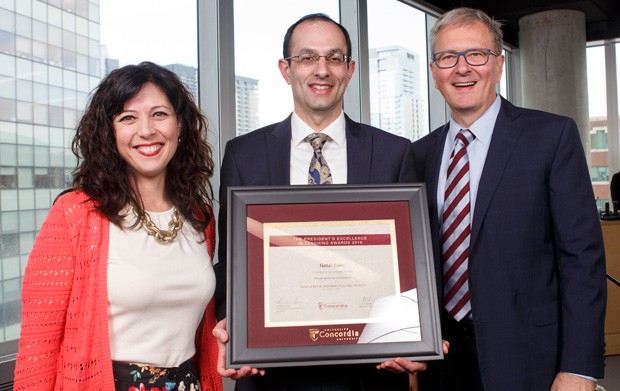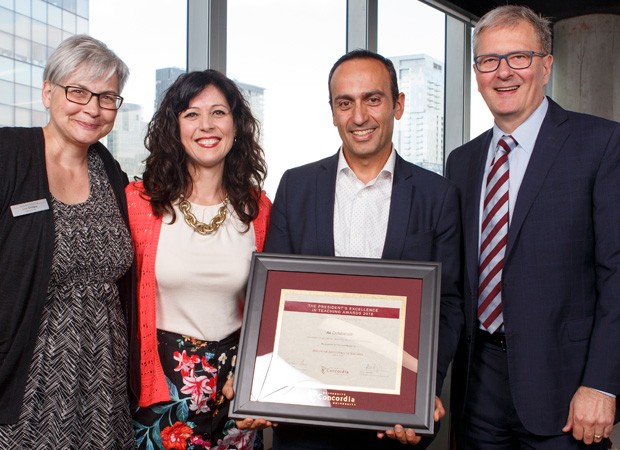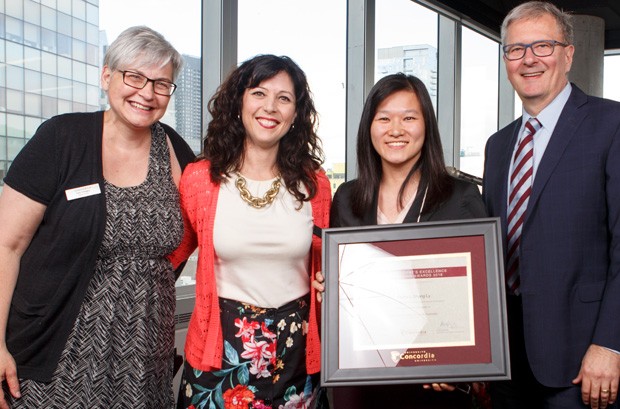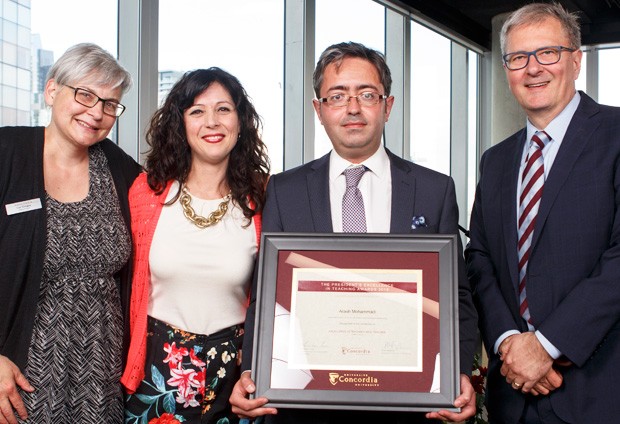Concordia honours 4 professors who go above and beyond for their students

The President’s Excellence in Teaching Awards celebrate highly engaged faculty who inspire, challenge and motivate students to hone their critical-thinking and problem-solving skills.
They honour exceptional teaching characterized by high-quality academics, pedagogical innovations that provide outstanding learning experiences, social responsibility and community engagement.
“Each year, this celebration provides the university community with the opportunity to recognize some of our very best faculty,” says Concordia’s president Alan Shepard.
The 2018 President’s Excellence in Teaching Awards recipients are:
- Naftali Cohn, associate professor and graduate program director
Department of Religions and Cultures - Ali Dolatabadi, professor and graduate and PhD program director
Department of Mechanical, Industrial and Aerospace Engineering - Samie Li Shang Ly, assistant professor (LTA)
Department of Supply Chain and Business Technology Management - Arash Mohammadi, assistant professor
Concordia Institute for Information Systems Engineering
“Professors ignite their classrooms, studios and labs with their generosity and enthusiasm, and help students recognize their own potential,” Shepard says.
“Their passion and willingness to explore new opportunities in their craft are what help to make Concordia a truly next-generation university.”
 From left: Sandra Gabriele, vice-provost of Innovation in Teaching and Learning; Naftali Cohn, associate professor and graduate program director of the Department of Religions and Cultures; and Alan Shepard.
From left: Sandra Gabriele, vice-provost of Innovation in Teaching and Learning; Naftali Cohn, associate professor and graduate program director of the Department of Religions and Cultures; and Alan Shepard.
Naftali Cohn: Award for Excellence in Teaching
Cohn’s dedication and leadership in teaching prompted his peers and students to nominate him for the award. His students describe Cohn as thoughtful, relatable, sympathetic, engaging and highly available.
“The way he runs his undergraduate classroom is the model upon which I wish to run my own in the future, says recent graduate Jesse Toufexis, who’s currently pursuing his PhD at the University of Ottawa.
“He fosters an environment of curiosity, in which students learn to speak up and participate,” Toufexis adds.
“He also puts efforts into building a syllabus that will get students as excited as he is. Most importantly, it was Dr. Cohn who introduced me to the material that set me on my current career path. I can’t think of a more deserving scholar for this award.”
Cohn’s teaching is based not only on imparting a body of knowledge and set of skills to students, but also instilling a love of learning, encouraging intellectual creativity, facilitating active independent participation in learning, and forging a personal intellectual bond between student and teacher.
“Naftali creates an environment for students that is conducive to exchange and the safe expression of their ideas,” says André Roy, dean of the Faculty of Arts and Science.
“Presence and mentoring are clearly part of his values as a professor. It is a true source of pride to have a faculty member in Arts and Science as passionate about the student experience as Naftali.”
 From left: Lisa Ostiguy, deputy provost; Sandra Gabriele; Ali Dolatabadi, professor and graduate program director in the Department of Mechanical, Industrial and Aerospace Engineering; and Alan Shepard.
From left: Lisa Ostiguy, deputy provost; Sandra Gabriele; Ali Dolatabadi, professor and graduate program director in the Department of Mechanical, Industrial and Aerospace Engineering; and Alan Shepard.
Ali Dolatabadi: Award for Innovative Excellence in Teaching
In his award nomination, students describe Dolatabadi as an inspirational force in the classroom whose enthusiasm is contagious. They insist he deserves to be recognized as much for his innovative approach to teaching as for his positive impact on the lives of his students.
“He is the perfect example of what a professor should be,” says student Sarah Morgan, vice-president of Academic Affairs for the Engineering and Computer Science Association.
“He is able to make monumental strides in his research, while still putting his students first. As a teaching assistant, I have modeled much of my style after him,” she adds.
“It’s because of Dr. Dolatabadi that I decided that I wanted to give back to younger students and strive to be as passionate as him.”
Dolatabadi’s teaching is focussed on individualized and personalized learning. He aims to answer the needs of students and develop strong working relationships with them over the length of their degrees.
“Ali has made outstanding contributions to teaching,” says Amir Asif, dean of the Faculty of Engineering and Computer Science (ENCS).
“He has introduced innovative excellence in learning pedagogy within the faculty in both the classroom and in curriculum, as a provost fellow and at the national level through the National Design Competition.”
 From left: Lisa Ostiguy; Sandra Gabriele; Samie Li Shang Ly, assistant professor (LTA) in the Department of Supply Chain and Business Technology Management; and Alan Shepard.
From left: Lisa Ostiguy; Sandra Gabriele; Samie Li Shang Ly, assistant professor (LTA) in the Department of Supply Chain and Business Technology Management; and Alan Shepard.
Samie Li Shang Ly: Award for Innovative Excellence in Teaching
Ly’s students describe her passionate dedication to teaching and enthusiasm for innovative learning techniques as unwavering.
“To this day, the MARK 201 course has been one of my favourites because of professor Ly’s brilliance,” says Lianna Della Vecchia, an undergraduate student in the Department of Communication Studies.
“The course was designed in such a way that community engagement, peers teaching peers, and the creative application of course materials to real problems was promoted. Professor Ly also invited me to participate in different endeavors like Innovatank — a business that offers experiential learning opportunities for people across disciplines.”
Ly’s teaching philosophy is based on four core strategies: transform every day: do not fear it, embrace it; collaborate and learn how to share; learning comes faster when it makes sense; and continue to learn.
“Samie is always trying new and different methods in her classroom that are creative,” says Raafat Saade, chair of the department of Supply Chain and Business Technology Management.
“She’s always pushing the envelope of teaching and learning by experimenting. Her teaching approach targets higher order thinking via visualization techniques and demonstrations that engage and stimulate student’s creativity and problem solving.”
 From left: Lisa Ostiguy; Sandra Gabriele; Arash Mohammadi, assistant professor in the Concordia Institute for Information Systems Engineering; and Alan Shepard.
From left: Lisa Ostiguy; Sandra Gabriele; Arash Mohammadi, assistant professor in the Concordia Institute for Information Systems Engineering; and Alan Shepard.
Arash Mohammadi: Award for New Teacher
Mohammadi’s students insist he’s not only one of Concordia’s very best faculty — he has also had a resounding impact on their lives.
“His ability to connect with his students and use real world examples were truly superior,” says Somayeh Davar, a graduate student in the Concordia Institute for Information Systems Engineering (CIISE).
“I have never experienced a teacher who is as motivated and talented as Dr. Mohammadi.”
Ali Al-Dulaimi, a PhD student in the Department of Electrical and Computer Engineering, says, Mohammadi’s professional image, innovation and creativity helped him to reach the decision to stay and continue his graduate studies at Concordia.
“Dr. Mohammadi inspires confidence and nurtures greatness in students to help them lead exceptional lives.”
Mohammadi teaches according to an integrated “student-centric” approach based on systematic lecture preparation, well-organized delivery in the classroom, and making himself available outside class.
“Arash has made outstanding contributions to his department and the university through innovative teaching, as well as research mentorship of undergraduate and graduate students,” says Amir Asif, dean of ENCS.
“For new faculty, these contributions are significant not only in terms of quality, but also in terms of their breadth and extensiveness.”
Read more about Concordia’s nine strategic directions, including take pride, teach for tomorrow, double our research and go beyond.


